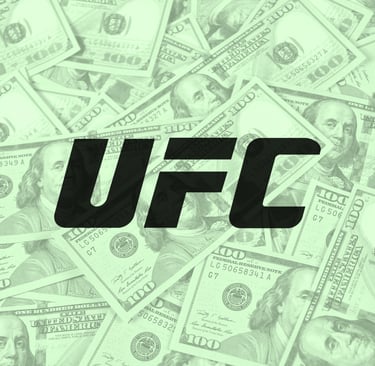Controversy in UFC Fighter Pay
This article looks at how UFC fighters are paid, why some earn much more than others, and how the UFC’s role in growing MMA affects those numbers. It also compares fighter pay to other major sports and explores both the criticism and reasoning behind the current system.
Kyriakos Lykourgos
5/16/20255 min read


The UFC is enjoying global success, but with great success comes great criticism. The franchise faces the most significant backlash in the sphere of ‘fighters’ pay’. The organisation hosts blockbuster events like UFC 300 and UFC Riyadh Season (first sports event in the Sphere), bringing in high pay- per- view numbers and thus high revenues. As such, most people following the sport believe that the athletes are cashing in equally from such success. However, the UFC chooses to reward some fighters heavily while leaving the majority earning much less. Even though this can be seen as unfair, it is a reflection of the UFC’s deeper role in building the sport of Mixed Martial Arts from the bottom up.
Comparison of the UFC to Other Leagues
To put the fighter pay issue into perspective, it helps to compare revenue splits with other major sports:
Sport/League Athletes' Share of Revenue
UFC 15–20%
NFL 48%
NBA 50%
Boxing (Top Stars) 70%+ from PPVs
There is a significant gap between organisation's revenues and athletes' pay. This causes a lot of criticism among fighters and fans. However, a simple comparison between UFC and NBA or NFL overlooks a key fact. The UFC is not a sports league that is operating within a pre established sport. The organisation is the key player that is working to build the sport of MMA as a whole, and there are certain costs that come with this responsibility.
Pay-Per-View
The UFC uses a Pay-Per-View (PPV) model. This means that to purchase a card/event fans pay a certain amount of money. UFC stars like Conor McGregor, Jon Jones or Israel Adesanya that are headlining these events have earned millions per fight when factoring in the PPV points. For example, UFC 229, which was headlined by McGregor, generated more than $30 million, with the featured fighter earning more than $3 million base purse (in addition to PPV points).
Even though the biggest stars of the organisation enjoy these benefits, this is not the standard. The majority of the fighters competing earn between $10,000 to $100,000 per fight, depending on their experience level and star power. These fighters do not earn PPV points, and sponsorship income is limited due to UFC’s exclusive deals with brands like Venum.
This system is in contrast to the earlier years of UFC, when fighters were able to secure individual sponsorship deals and showcase their branding during walkouts and fights. This ended with UFC's deal with Reebok in 2015, which eliminated fighters' opportunities to showcase personal sponsorships, and in effect standardised sponsorship earnings to $2,500 per fighter per fight. ($2,500 is a base level under the Reebok tiered system; top fighters earned more.) This was beneficial for the UFC because it brought consistency and polished the organisation's brand image, but it considerably reduced funding opportunities for fighters.
Other Revenues
The UFC has an exclusive deal with EA sports for the 'EA SPORTS™ UFC 5' video game. Former champion Demetrious Johnson has previously stated that he earned around $72,500 of all editions of video game. He also mentioned that the payments were calculated based on character usage metrics.
The UFC also retains extensive rights over the fighters' image and likeness. The standard UFC contract gives to the organisation broad control over how fighters’ names, images, and likeness (NIL) are used in official UFC products. However, athletes are generally free to do whatever media appearances they want, or pursue different endorsements outside the ‘fight week’. In addition, some well-known fighters earn royalties from merchandising revenues.
This poses a problem because fighters get the most attention the week before their fight, and this eliminated opportunities to promote brands that may want to sponsor them. Moreover the UFC sells products with the fighter’s NIL and the fighters do not enjoy substantive benefits. Finally, merchandising channels often benefit the UFC as an organisation significantly more than the individual athletes themselves.
Building the Sport
Unlike other sports with long-standing infrastructures, MMA is still maturing, and the UFC is the biggest player working to promote that growth. The organisation has been investing heavily in the popularisation of the sport, and it is the sole reason the sport went from being illegal in most countries/states to being one of the biggest sports globally. The UFC has invested heavily in infrastructure, such as Performance Institutes in different countries. These facilities allow fighters to train and use specialised personnel to recover, get proper nutrition, and additional services with no personal cost. (There are UFC Performance Institutes in Las Vegas, Shanghai, Mexico City, and others planned to be built in future.)
Moreover, the UFC is actively expanding into new markets. This is foundational work which is really expensive but crucial to elevating MMA as the mainstream sport. Other MMA organisations often grow on the back of this work rather than investing themselves. They are hoping for the UFC to grow the sport and for them to grow with it.
For fighters trying to build and elevate their careers, the UFC offers an incomparable platform. The UFC offers a reach that no other fighting organisation can compare with as a result of its deals with broadcasters like ESPN or TNT who offer marketing and exposure unparalleled with any competitor. Fighters may not enjoy direct revenue benefits by this; however, building their brand can lead to more commercial opportunities outside the cage.
Critics often argue that the UFC is not protecting their stars and it keeps the spotlight on itself. Although we have examples like McGregor, Adesanya, and Makhachev, we see the organisation refusing to give too much power to these stars and it chooses to keep the UFC name front and centre. That does not mean that the organisation is ignoring its fighters. It means that the UFC is limiting its dependence on any one athlete. This allows the organisation to be independent and not put in the corner of any sudden retirement or contract stand-off. Even though the UFC is continuously promoting and investing in its stars, it has a great way to keep its name intact and this strengthens its long-term planning.
Will It Change?
Although a lot of fighters and fans will argue that fighter pay should change, my belief is that maybe it does not need to. The UFC was and will be the only promotion that is paying the fighters on time and that is consistently investing in MMA as a global sport. (While most organisations pay reliably, UFC’s payment structure is known to be consistent and timely.)
The promotion has a clear structure of how and where to invest the money and how the company should be run, thus I believe if there is no extreme circumstance (eg.court decision) that there would be no significant change in the future. Even though high- profile cases like Francis Ngannou bring the spotlight and show that there are lucrative opportunities outside the UFC, these are the exceptions and not the rule. (Ngannou’s PFL deal reportedly includes PPV revenue and guaranteed $2M+ purses.)
The UFC is operating as an organisation that prioritises building and developing the sport while enjoying profits. It is not a non profit organisation, and thus blaming the organisation for unfair pay from the point that no other MMA organisation has ever succeeded and paid their fighters more is a mistake. (Some orgs like PFL and Bellator have paid higher per-fight purses to top fighters, but not consistently.) This story is not only about fighters' pay, it is also about who is shaping the sport’s future, who helps the sport be more transparent (payment schedule, deals, health insurance etc). Lastly, even if all fighters could enjoy some higher payments, and they probably deserve it as well, the UFC is doing a phenomenal job on building the MMA industry bottom up.
